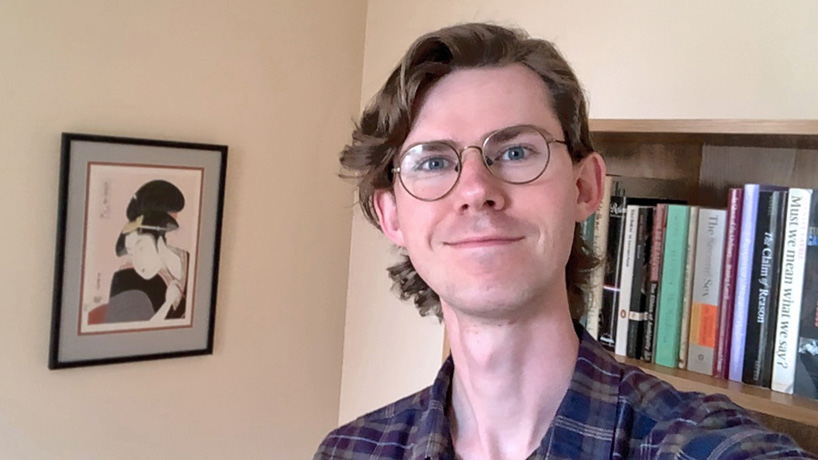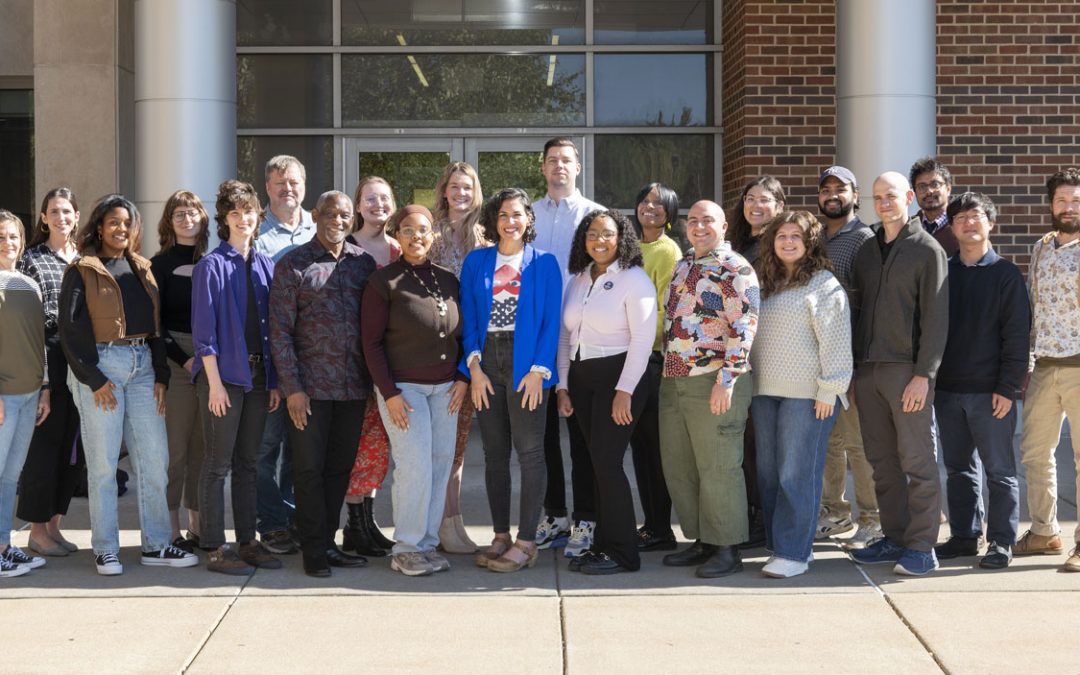
Sam Filby’s master’s thesis centered on ideas of social epistemology, which highlights the ways in which humans depend on other people for what they know. (FaceTime photo by August Jennewein)
Most people probably hesitate to the take the word of a stranger shouting on a street corner.
They’re might only be a little more trusting of a message they overhear someone asserting two tables away at a coffee shop.
But what if the voice delivering the same message is sitting across the table, speaking directly to them? What if the voice belongs to a person they know? What if that person has a background that’s provided them expertise on the issue at hand?
“Depending on your relationship to that person and what you know about them, there’s a corresponding level of justification that goes with it,” said Sam Filby, a spring 2020 graduate who earned his master’s degree in philosophy at the University of Missouri–St. Louis.
Filby used his master’s thesis to dive into questions of social epistemology, which highlights the ways in which humans depend on other people for what they know.
UMSL proved to be an ideal setting for Filby to grapple with these issues. Professors Eric Wiland and Billy Dunaway were particularly influential.
“UMSL’s philosophy department is small and extraordinarily friendly,” Filby said. “Eric and Billy and are two of the smartest people I’ve ever met, but they’re still extraordinarily kind. That kindness allows you to feel encouraged but also allows you to know what you need to work on, what you should be thinking about, what you should be developing in your thoughts and what’s genuinely interesting.”
Filby hadn’t always felt so supported or had his insights valued when he was pursing a master of studies in philosophical theology at the University of Oxford in England.
He studied there for nine months, taking a series of eight-week courses in the philosophy of religion and philosophical theology.
“It was very intense,” Filby said. “At the end of Oxford, I was very burnt out and also kind of forgot why I was interested in philosophy in the first place because the more and more you get in to these deep areas of research, the further philosophy distances itself from the more existential questions that drew me to it.”
Filby took a year off after Oxford and moved back to Seattle – where he’d earned his bachelor’s degree at Seattle Pacific University – to work in a coffee shop and do some teaching at his alma mater.
He always knew he’d return to school at some point. He came across some papers written by Wiland about moral advice that captivated him and wound up emailing him out of the blue to inquire about UMSL’s master’s program.
At the time, Filby was also looking to move somewhere closer his parents in Greenville, Illinois, a town of about 7,000 people located 50 miles east of St. Louis.
Filby wound up working as Wiland’s research assistant, helping with the manuscript for an upcoming book “Guided by Voices: Moral Testimony, Advice, and the Forging of a ‘We,’” after he enrolled at UMSL in 2018.
A course taught by Dunaway last spring sealed his interest in epistemology, and Dunaway became his thesis advisor.
“Sam stands out because he’s very good at making the clear distinctions philosophy needs if it is to be done well, and then he’s disciplined about pursuing arguments based on those distinctions to make interesting, original points,” Dunaway said. “He never gets bogged down too much in the details for their own sake. He’s able to keep an eye on the big questions that have animated thinkers throughout the history of philosophy and to connect his research with these questions, which are what many students find so fascinating when they first start studying philosophy.”
Filby had begun pondering some of those questions when he was in high school.
He grew up outside Dublin, Ireland, until the age of 11, when his family relocated to a country house near Greenville. He felt culture shock attempting to adapt to his new surroundings and didn’t have easy access to other kids his own age.
Instead, he spent a lot of time walking around by himself or in his room journaling and reading.
“I think the move effectively made me an introvert,” Filby said. “I was a very solitary teenager. I found myself interested in topics that immediately related to my life in some way. So, I was thinking a lot about God. I was thinking a lot about ethics and how to live. I was thinking a lot about what sort of government we should have.
“I was basically led to philosophy kind of accidentally because I was trying to find who had thought about those questions before. Those figures then became a resource to eventually spring off of.”
A bachelor’s and two master’s degrees later, Filby is ready to continue his philosophical journey. He was accepted into the doctoral program at Northwestern University with a stipend and will begin his coursework in September.
He aims to build on the work he’s already done in social epistemology, applying it to the world of politics by examining the nature of misinformation and propaganda, not to mention the increasing dismissal of inconvenient truths as fake news.
Filby is excited to be working with noted faculty members such as Jennifer Lackey and Sandy Goldberg, leading thinkers in that area.
His time at UMSL has also given him confidence as he moves onto this next stage in his academic career.
“I think working with Billy in particular showed me that I had interesting things to say and that there were things worth developing,” Filby said. “Working with him kind of allowed me to trust my own voice.”














